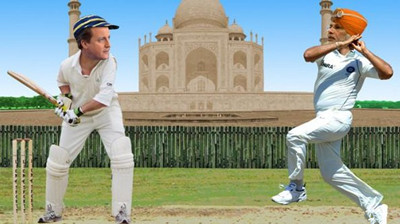白芝浩專欄
The great game
板球中看英-印關系
To improve his grasp of Anglo-Indian relations, David Cameron should watch more cricket
為改善對英-印關系的把握,戴維·卡梅倫應從板球中汲取教訓
“IT IS in the matter of patience”, wrote Lord Harris, an early England cricket captain and later ruler of the British empire's favourite game, “that I think the Indian will never be equal to the Englishman.” It was interesting to recall this last month as India's batsmen were trouncing England's at Lord's, the north London home of cricket. And that was not all that would have horrified Harris who, as a 19th-century governor of Bombay (now Mumbai), was widely credited with introducing cricket to India.
“這是耐心的問題”,哈里斯勛爵曾經寫到:“我認為印度人將永遠無法與英國人匹敵。”作為早期的英格蘭板球隊隊長和后來的大英帝國最鐘愛的游戲的主導者,哈里斯萬萬沒有想到,就在上個月,印度擊球員在倫敦北部的貴族板球場痛擊英國,使這一評價成為一個笑話。而這只是使這位19世紀孟買州長、公認的將板球帶入印度的第一人震驚的一部分。
Nothing illustrates the turnabout in British-Indian relations more starkly than India's financial and political takeover of what was once an English summer game. When India's best cricketers played their first Test match—cricket's gold-seal, five-day format—at Lord's in 1932, around the time Harris delivered his racist verdict, they came as hapless colonial subjects. At home they were the idols of an unlikely national religion. In England, where it took them four decades to win, India's cricketers were timorous, poorly paid and uncompetitive. Yet in the 1990s India's growth rate picked up, sparking a sports-media explosion which has transformed the world's second-most-popular game; over 80% of cricket's revenues are now said to be generated in India.
沒有什么比印度對這一曾屬于英國的夏日游戲的金融和政治接管更能充分地表明英屬印度關系的轉變了。1932年,當印度最杰出的板球運動員們在貴族板球場首次亮相,開展為期五天的對抗賽時,哈里斯頒布了他的種族論,使他們成為了一批倒霉的殖民主體。在印度,他們是一個沒有希望的民族宗教的偶像。而在英格蘭,在這個他們花費了四十年來獲取勝利的國度,這些印度板球運動員唯唯諾諾、入不敷出,毫無競爭力。然而,在上個世紀90年代,印度的經濟增長率回升,促使體育傳媒迅猛發展,轉變了這一全球第二大流行的賽事。如今,已有超過80%的板球收入在印度產生。
The Indian team that visited England this summer—to play a five-Test series which ended this week—included some of the world's richest sportsmen. Its captain, Mahendra Singh Dhoni, earned $30m last year; hardly any English player made a million. And money buys influence. Holding court at Lord's was a ponderous Tamilian, N. Srinivasan, wearing jam-jar glasses and a smear of vermilion to denote his high Hindu caste. The boss of India's and the world's governing bodies for cricket, he is the most powerful cricket administrator since Harris. He also owns one of India's best cricket teams, the Chennai Super Kings, in the world's fastest-growing sports contest, the Indian Premier League.
今年夏季,印度板球隊員們本周結束了在英國的五國對抗聯賽,他們當中的一部分是全球收入最高的運動員。隊長馬亨德拉·辛格·東尼去年的收入是3000萬美金,而在英國,幾乎沒有板球選手的收入超過百萬。金錢帶來了影響力。在貴族板球場主持開場的是呆板的T.N.斯里尼瓦桑,他那果醬罐眼鏡和涂片紅唇展示著他的高種姓。作為印度和世界板球管轄機構的老板,他是自哈里斯之后最具影響力的板球權威。他還在全球發展最快的體育競賽---印度板球聯賽上擁有著金柰超級國王隊,這支隊伍是印度最好的板球隊之一。
For David Cameron, a cricket fan, there are lessons here. The Conservative prime minister has made improving British-Indian ties one of his priorities. Cricket, the international arena most disrupted by India's rise, suggests how he might attempt that.
板球迷戴維·卡梅倫應從中汲取經驗教訓。保守黨首相已將改善英國與印度的關系列為首要任務之一。被印度崛起擾亂的板球國際競技場啟示著卡梅倫該如何采取行動。
The first lesson is that he is right to try. Countries that share a colonial legacy, including language and culture, should trade together far more prodigiously than Britain and India do. Cricket symbolises their bond; no other countries have so defined themselves by it. For eminent Victorians, cricket displayed their national virtues. It was “English, you know quite English,” wrote Harris. That is why their aspiring Indian subjects—with little help from Harris—embraced it. And a trace of that anglophilia endures among India's elites. It was suggested by Mr Srinivasan's emotional response after his team, the world champions of lower-brow one-day cricket, won at Lord's (though they lost the series).
第一條經驗是,他的嘗試是正確的。共享包括語言和文化在內的殖民遺產的國家本該更多地開展貿易,而英國和印度卻沒有。板球象征著兩國的關系紐帶,這是其他國家從未如此定義過的。維多利亞時代的名人則認為,板球展示了他們的民族美德,如哈里斯所定義的“英國精神”。因此,在哈里斯的幫助下,那些有抱負的印度人積極地追捧板球。在印度精英中出現了一種長期的親英趨勢,這源自斯里尼瓦桑提獲勝后的感言,當時他的隊伍在貴族板球場贏得了比賽(盡管他們輸掉了聯賽),這是一支低額一日板球賽的世界冠軍隊。

Yet most Indian cricket fans have perhaps never heard of that venerable English ground. Their enthusiasm is almost for a different game, the glitzy, shorter formats at which India excels. Cricket represents for them a different national story: India as a “cricket-crazy nation”, a youthful, patriotic place, bursting with hope and a desire to consume. This is the India that has got Mr Cameron excited for its economic potential; it will take more than appealing to a common history, in which young Indians are uninterested, to win its love. Taking England's winsome cricket captain, Alastair Cook, on the prime minister's next trip to Delhi might help.
然而,大多數印度板球迷們或許從來沒有聽說過那古老的英國球場。他們所熱衷的幾乎是一項完全不同的運動---一項印度人所擅長的激情洋溢、節奏緊湊的運動。對印度來說,板球則有著不同的含義:印度作為一個“為板球而瘋狂的國家”,是一個充滿活力、愛國情懷的地方。這里充滿希望和消費欲。正是這樣的一個國度,使得卡梅倫先生為她的經濟潛力而驚艷。為贏得印度的青睞,英國需要更多的措施,而不僅僅是強調共同的歷史,因為年輕一代的印度人已經對此毫無興趣。在首相先生下次訪問新德里時,帶上英格蘭隊迷人的板球隊長阿拉斯泰爾·庫克或許會有所幫助。
A more sobering lesson for Mr Cameron concerns the nature of Indian power, which has bruised cricket. India's growing influence has, in large part, been traumatic and divisive to a game which is unusually based on international competition. The collaborative culture that formerly governed that, albeit tinged with Anglo-Australian self-interest and suzerainty, has broken down. What India wants in cricket, concerning the international programme and sales of media rights, or even the rules of the game and its administration, it increasingly gets.
卡梅倫先生更應清醒地關注到印度的權利屬性,這已波及到板球領域。印度日益增長的影響力,對于這一不曾基于國際競爭的對于在很大程度上來說,是具有殺傷力的。盡管與英澳利己主義和宗主權有著千絲萬縷的聯系,昔日占主導地位的寫作文化已不復存在。印度想要在板球領域所獲得的利益,如:國際計劃和媒體播放權的銷售,甚至是賽事的管理和規則,都逐漸納入囊中。
That was clear earlier this year, when India demanded more of the international revenues its team is mainly responsible for generating. This was not unreasonable; but the threatening way it negotiated, the craven way England and Australia accommodated it, and the resulting impoverishment of Pakistan, New Zealand and other poorer cricket nations were contemptible. What was once an English game, then an international one mapping the former British empire, is India's to command. And this is a worrying prospect for cricket, given the match-fixing, infighting and administrative chaos that are other aspects of the game in India. The fact that Mr Srinivasan, even as he negotiated cricket's new architecture, was suspended from the Indian cricket board while being investigated over corruption allegations, seemed indicative of this.
很明顯,今年年初,當印度想要獲得更多的國際收入時,她的板球隊挑起了大梁。這并不是不合理的,但威脅式的談判使英國和澳大利亞只得懦弱地容忍,更使巴基斯坦、新西蘭等不擅長板球的國家每況愈下。曾專屬于英國、在國際上代表著大英帝國的比賽,現已由印度主宰。然而,在印度的板球賽有著不同的一面—假球、勾心斗角、管理混亂,使得板球前景堪憂---盡管曾有意構建印度板球新局面,斯里尼瓦桑已被印度板球委員會停職調查、正面臨著貪污腐敗的指控足以證明。
Play hard, play fair
嚴格公正的競爭
That suggests two final truths for Mr Cameron. First, to expect no favours; India's power brokers are ruthless and obdurate in cricket and otherwise. Indeed cricket, because of its wealth and popularity, is another facet of Indian politics. India's prime minister, Narendra Modi, and finance minister, Arun Jaitley, are among a clutch of Indian politicians leading state cricket associations—which makes the chaos in Indian cricket all the more dismal.
卡梅倫首相應認清兩點:第一,不要指望得到好處。印度的權威經紀不論是在板球還是在其他方面都是安忍無親、冷酷無情的。的確,板球因為財富和聲望,是印度政治的另一面。印度總理納倫德拉·莫迪和財長阿倫·杰特利是印度政客領導的板球協會中的要員—這使得印度板球的混亂加劇。
The second lesson is not to do as England's cricket board did and bow to Indian bullying. In world trade and climate negotiations, where India has been unhelpful, and in its recent high-handed treatment of foreign investors, its bad behaviour should be condemned and resisted. Respecting India as a rising power is not the same as pandering to its elite's worst compulsions.
第二,不要像英國的板球委員會一樣向印度的強勢低頭。在世界貿易和氣候變化的談判中,印度一直毫無幫助。近來,又對外國投資者采取了高壓的政策,這些不良行為應當受到譴責和抵制。對印度這一正在崛起的大國的尊重,不能等同于對她的精英中最惡劣的沖動行為的縱容。
If Mr Cameron, whose diplomacy tends to veer between finger-wagging and love-bombing, cannot see the difference, Indians can. And in a fading corner of their cultural memory, haunted by self-righteous but upstanding Victorians such as Harris, is perhaps a small feeling that the creators of cricket should hold India to a higher standard. Mr Cameron should honour that.
如果卡梅倫首相的對印政策傾向于在堅決抵制和縱容之間搖擺,那將毫無意義,只會讓印度獲益。由于那些像哈里斯這樣---自以為是、卻又正直誠懇的維多利亞時代的人失誤,板球的創造者不應小瞧印度這一觀點,被擱置在了兩國文化記憶中布滿塵埃的一隅。卡梅倫首相應正視印度的實力。












